Those of you who know me are aware of my intense pride in my Italian/Belgian heritage. My father was of Belgian parentage and my mother Italian.
In late August, together with my son Derek (he of ‘Born with a Tail’ blog fame), I returned to the homeland of my maternal grandparents for a short visit. The village is called Brosso and the general area is named the Canavese. It is located in the region of Piedmont in the northwest Province of Torino, in the foothills of the Italian Alps.
My mother’s maternal grandfather and uncle, whose family name was 'Bolettino,' left Brosso for Canada around the turn of the last century. Like countless other European immigrants to Canada, they came to make some money for their family, who stayed back in Italy waiting patiently for their return. If everything worked out they would have their family join them in their new homeland. Perhaps they could escape the class system, frequent wars and deprivation, and a cramped difficult life of hard toil and little opportunity.
It was not to be. The uncle, Stefano (Stephen or Steve in English) Bolettino was killed in a coal mining accident in Canmore in 1901. He is buried in the old Canmore cemetery. He was 17 at the time of his death. Stefano's father died in the southern Alberta town of Taber four years later of a heart attack, so the story goes. He too is buried in Canmore, next to Stefano. They never did return to Italy and neither did their families ever join them in Canada.
In 1909, my paternal grandfather Giovanni (John) Bovio together with his wife Irene – the daughter of the miner who died in Taber and the sister of young Stefano - immigrated to Canada. No doubt their reasons were the same - to seek opportunity and to get away from the vicissitudes of the European struggles of the times. They settled in Bellevue, a coalmining town in the Crowsnest Pass lying just on the eastern edge of the Frank Slide in southwestern Alberta.
Communications were never lost between the Canadian family and the family left in Italy. My grandparents - the Bovios - kept exchanging letters with their brothers, sisters and cousins from the time of their arrival in Canada. When they passed away, my mother and aunt continued to maintain contact. And in 1954 my first cousin, Gary Vernon, who later made his home in Ottawa , was the first of the family to return for a visit. Since that time, my mother and aunt, both now deceased, and my cousin Gary and I and our families have made many return visits to the ancestral homeland. We continue to exchange letters, cards and now emails with our Piemontese cousins.
What follows is a description of the recent visit of Derek and I to Brosso, together with some geographical and historical background of the region.

Road from Malpensa to Ivrea
ARRIVAL – TUESDAY AUGUST 21
I flew from Calgary to Malpensa airport west of Milan, via London arriving at dusk at about 7:30 PM in a blinding rainstorm. I picked up my car with little difficulty from Eurocar Rentals.
But then the problems began. I had tried to acquaint myself with all of the doodads of an Alpha Romeo (diesel, and a reasonably pedestrian model by Italian standards). After doing so I made a valiant effort at getting out of the airport in the face of the driving rainstorm. I could not read the signs. I could not tell if my lights were on or off. I would hit a veritable lake of water on the road and think that my car would stall., if not completely submerge. Try as I might, I could not even see the signs to the little village where my hotel – called the ‘First Hotel’ – was located. I drove on this nightmare for an hour, and finally found my way back to the car rental agency at the airport. I told them I would pick up the car the next day when I could see.
The next day I discovered that the 'First Hotel' was 1 km from Terminal 1 and Terminal 2. Lesson learned - after a long flight, just check into your hotel. Rise up to the challenges of travel the next morning.
Happily, the ‘First Hotel’ had a shuttle van from the Airport and so I made it there quickly and with no further problem. It was a small hotel in a little village. In order to get to the hotel the shuttle had to maneuver many turns on the narrow road inside the village. I don’t think I could have found it if I had been driving – after flying all the way from Calgary without a break.
First Hotel was a pleasant and clean place and very convenient for the traveler arriving late at night. I arrived at about 11 PM. Although the restaurant was closed, they whipped up a plate of excellent lasagna and after that together with a couple of glasses of excellent vino rosso, I retired for the evening and slept soundly.

DAY ONE – WEDNESDAY AUGUST 22
The next morning I took the shuttle back to the car rental agency and drove the Alpha Romeo out of the lot onto the highway. From the time of my first shift came the unmistakable sound of grinding gears. Italians like the standard shifts for some ungodly reason. I found the A4 autostrada out of Novara and proceeded westward gradually getting into the beautiful hills around Ivrea.
Entering the autostrada - a six-lane divided toll highway - was interesting. I had forgotten how to do it. I drove up to an unmanned gate and puzzled over what happened next. The gate was closed. There was no one to give me a ticket and looking at the bells and whistles of the machine outside of the window of the driver’s side literally rang no bells for me. After puzzling over this for several minutes, and with impatient Italian drivers in back of me leaning on their horns, I pushed the ‘help’ button. An exasperated voice came over the intercom. It sounded as though it was saying: “Poo teegat.”
Now what the hell could that mean - "Poo teegat?" After a few more desperate minutes it came to me. “You dummy!” I thought. ‘Pull ticket” is what the guy was telling me. As luck would have it, there was a ticket at the bottom of the machine to be pulled. I ‘pooed' the 'teegat,’ and voila! The gate opened and I was on the A4 from Milano to Torino.

"Poo Teegat"
I had arranged to meet Derek at 1 PM at the train station in Ivrea. I exited the A4 just east of Ivrea. I marveled at the impressive green, wooded, hilly and mountainous terrain, which had dimmed in my memory in the fourteen years since I had been there last.

Ivrea Countryside
I drove through the village of Banquette, turned left where the sign said ‘Centro’ and went along the Via Torino until I saw the unmistakable front of the Station, which I had seen many times over five previous visits. I drove into the parking area and was about to turn off the engine when Derek opened the passenger door and remarked on the accuracy of our timing. It was exactly 1 PM.
Ivrea is a city of some 25 or 30 thousand lying about 50 kilometers north of the City of Torino (known to anglos as ‘Turin,’ and the home of the ’88 Winter Olympic Games). It is part of a greater Torino metropolitan area which contains – including the city of Torino – about two and half million people living in many surrounding towns and villages. This is part of the industrial heartland of Italy – a highly prosperous northern strip extending west to east from Genoa to Torino, through Milan, and to Venice on the Adriatic.
Ivrea was the birthplace and home for many years of the famous Olivetti Business Machine corporation. It lies nestled in the foothills of the Italian Alps and marks the southern beginning of the magnificent Val D’Aosta. The Val d'Aosta then extends northwards into the Alps of France, Switzerland and Italy. These mountains, which are home to some of the great ski areas of the continent, are little more than an hour or so away.
We drove to the hotel – ‘La Villa’ - two kilometers south of the station along Via Torino. ‘La Villa’ is a comfortable and clean, family run hotel, with a nourishing breakfast room and pleasant management. We then rested and talked for an hour before I called my cousin Betty. Twenty minutes later she arrived at the hotel. Betty grew up and was educated in London, where her mother and father (a first cousin of my mother) had immigrated after the Second World War. She and her mother, Fiora, had returned to live in Italy in the mid sixties after the death of her father. Betty had a fine career as an executive secretary with the Olivetti organization. She is an invaluable companion as a friend and translator whenever I or any of my family visit.
French is spoken and widely understood in the region because of the geographical and historical proximity to France and French speaking Switzerland. And like other locales in western Europe, there are increasing numbers who speak English, particularly among the young, who have been taught English in school. Although my Italian is less than adequate, my French is much better, and between the three languages, I communicate reasonably well with everyone.
She then took us on a short tour of Ivrea and its immediate surroundings. We stopped first of all to see the lake at Lake Sirio, located in a small valley east of Ivrea. It is one of the many picturesque smaller lakes in the region, and is surrounded by forests, which are scattered with well-built and well-cared for villas.

Lake Sirio
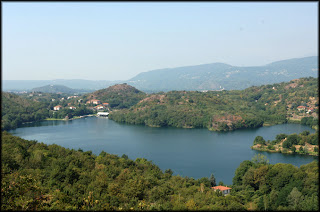
Betty’s cousin and her husband have a small resort at Lake Sirio. It includes a swimming area, cabanas, a concession stand and a restaurant. The cousin is a tall, fair-haired, svelte, attractive woman of 40 or so who is married to a highschool physical education teacher. His family have been operating this very pleasant facility for many years.
After taking some time to admire the view and the resort, we went to the nearby Hotel Sirio to have a look around. The hotel was nicely appointed in an attractive minimalist Scandinavian style. But make no mistake - a classy operation - very upscale and comfortable I am sure.
After a few minutes at the Hotel Sirio, we got into Betty’s car and proceeded a few kilometres to the top of a steep incline, where we arrived at the Castello di St. Giuseppe, a beautiful old castle that was converted into a first class hotel some years ago. It has a commanding view of Ivrea and its lake-studded wooded environment.
Ivrea, I must say is looking good. And prosperous. Although it was said that there was some hardship when Olivetti closed its operations there a few years ago, you could not tell it by the construction that is going on. There are many new homes, condos, and commercial establishments being built in various stages of completion. There is also plenty of renovation and restoration going on in the old town of Ivrea. The two large piazzas are now traffic free and the buildings surrounding the squares have been rehabilitated to their former grandeur.
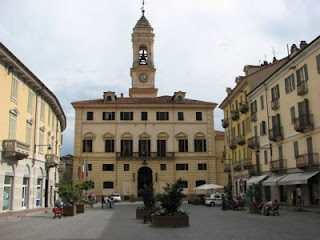
Ivrea - Piazza Vittorio Emanuele
We arrived at Betty and Fiora’s comfortable condo in Ivrea at about 6 PM. Betty prepared an excellent spaghetti and caprese salad dinner and we continued our discussions. Fiora is a marvel. Looking at least 25 years younger than her 97 years, she has great wit, and a prodigious memory. Her sister, who lives in London, is still going strong at 100. She is also spry and gives every impression that her age is the least of her concerns. We chatted about the various family members - those who stayed and those who went to Canada, the Bolettino family, the Bovios (as many as she could remember).
We discussed politics of course. Like most of Italy, Piedmont is a political hotbed. It was the home of the first King of a united Italy – Victor Emmanuel II – who was born in Torino and as King of Piedmont, Savoy and Sardinia fought for the unification of Italy. Piedmont’s partisans fought valiantly against the German occupation during the war. It has had a long pro-labor tradition because of the labor intensive manufacturing capacity – particularly in respect to automobiles. Torino is the home of the major manufacturing plants of Fiat and Lancia automobiles. The region is also a center of support for the ‘Lega Norda’ (the Northern League) which advocates regional autonomy for the Northern Italian regions, the basis of which is the League's basic belief that the north has always subsidized the inefficient south part of the country, and its high time that it should end.
Their apartment is very comfortable – two bedrooms, a sitting room, and kitchen/dining area. They have good health care system and doctors who render excellent care - including house calls.
We ended our deliberations at about 10 or so. Betty drove us back to our hotel and said she would pick us up at 11 the next day.

Lower L to R - Fiora and Betty
DAY TWO - THURSDAY AUGUST 23
After a fitful sleep and breakfast, she picked us up at the appointed time. Today our plans were to drive up the mountain to Brosso to make our rounds.
Brosso is a small village of 500 or so souls. From Ivrea, it is located a distance of 8.7 kilometers up a 500 meter incline of narrow zig-zags, esses, and hairpin turns. From Ivrea, Brosso’s church and steeple sitting on a ridge north and west of the city, can clearly be seen.

View towards the Dora Baltea River and Ivrea from the Brosso Churchyard
A driving tradition on this road that I observed first in my inaugural visit in 1963 is that as the small European cars move along, they beep their horns such that the oncoming traffic around a blind corner can be warned of their presence. Notwithstanding that the highways and by-ways are in good shape, there are plenty of car accidents. Speed is generally the culprit. I have known many people in the region as well as several of my relatives to have met their maker on roads in the region.
Prior to entering Brosso, we decided to visit more nearby villages along a valley called the Val Chiusella. Brosso is one of about a dozen picturesque villages in the Val Chiusella. These villages are strung out about a distance of 15 kilometers westward to the end of the Val Chiusella road.

Map of the Val Chiusella
These villages include Alice Superiore, Vico, Traversella and Fondo and are only a very short distance removed from their neighboring village. The region has a strong family agrarian tradition of keeping livestock and the harvesting of feed from the nearby hills. But it is mining and metallurgy that were the mainstays of economic life going all the way back to at least Roman times. Producing iron out of pyrites and hematite was the chief traditional industry. Brosso was one of the main suppliers of metal and iron to the King of Savoy. Ultimately the coming of the industrial revolution brought forth mass production manufacturing in Torino and Ivrea.
In the twentieth century factories such as Fiat and Olivetti became the major providers of employment for their residents. More recently, the villages have become summer retreats where city dwellers can have a restful and comfortable respite from heat, humidity and crowds of the cities at lower elevations. Thus population of these villages grows dramatically during the summer months.
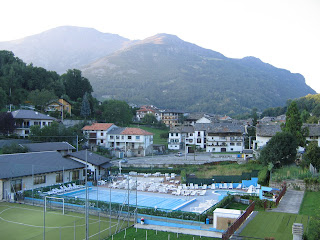
Brosso - the old and the new
We drove through the quaint slate-roofed villages of Vico, Traversella, and continued on to a stone bridge constructed in Roman times in the tiny village of Fondo. The bridge, a graceful, curved structure over a small stream, is still in use. Ancient stone residences, are now renovated and house families who get away from it all during the summer. The Roman Bridge at Fondo marks the end of the Val Chiusella road. It is surrounded by steep grassy and treed mountains leading north and west to the Gran Paradiso National Park. To the west, about 30 kilometers away as the crow flies, but inaccessible by road, is the skiing mecca of Val d’Isere in the French Alps. On this day, with the tops of the mountains shrouded in mist, the view and ambience were downright enchanting.

Roman Bridge at Fondo
I was reminded in looking at this beautiful countryside, how similar it was to the Crowsnest Pass or Canmore, and how the Italians from the Val Chiusella who immigrated to those places must have found their new home to be so much like their homeland. Given the similarities of these regions, no doubt the new immigrants to Canada felt remarkably at home. Having hiked around a bit, taken some photos at the Bridge and visiting a now closed former ski area, we drove to Brosso.
There were many changes since my previous visit in 1993. I noticed huge estate type homes built on the hills, many of the older buildings rehabilitated, and a large public swimming pool at the edge of town, all of which were new to me.
On my first visit to Brosso 44 years ago, I found a sleepy village of many crumbling ancient homes built atop stables, with irregular slate stoned roofs, and primitive bathroom facilities. As time went on, each time I returned I observed more of the modern world – some tiled roofs, then regular slate roofs of uniform thicknesses, better bathroom facilities, then a tennis court, and now a public swimming pool and estate sized new homes, the ancient homes renovated and still retaining the old world charm. And all of the modern conveniences.

Old home now restored and renovated in Brosso
Most everyone I talked to now lived in two-car families. Children were no longer looking to Olivetti or Fiat for a career on the assembly line. They are going to college. Brosso, like Ivrea, is looking comfortable and prosperous. However, not everything has changed. The two alberghos (bars) that were there on my first visit remain unchanged and are still the watering holes of primarily the male village residents. However, they have competition with a new one having opened recently – more modern and hip with a definite 'anglo' name – ‘The Black Scorpion.’

Street Scene in Brosso

One of the Two Piazzas in Brosso

The other Piazza with City Hall on the left
Our first stop in Brosso was the home of my cousin on the Bovio side, Rita Loppo and her husband Italo. They live in a comfortable home on the northern edge of the village. The home is relatively new – about 40 years old – and with all the conveniences. Unlike most Brosso homes, it has a tiled roof instead of a slate roof.
Rita immediately retrieved an excellent bottle of vino rosso from her wine cellar, whereupon we sat in her living room and caught up as to our health, adventures, and major events of our lives. Probably 80 or more, Rita retains her quiet charm that I remembered from earlier visits. She remains tall and serenely elegant and healthy. Italo has to take oxygen because of damage to his lungs acquired from too many years in the mine. But he looks well and maintains his friendly and cheerful disposition.

L to R - Derek Raymaker, Rita, Darryl Raymaker, Italo
From Rita’s we went over to 86 year old Nene Valesa, who is a widow of another first cousin of my mother, Eraldo. Eraldo passed away some years ago. Her daughter Ornella had just arrived from her work at the post-office in Burgo – Franco, a little town on the Val D'Aosta road. Nene looks well. Her skin and facial features are very smooth and unwrinkled. She has trouble walking and is a diabetic. She was very happy to see us. She has live-in home care provided by Emmanuella, a young late teen or early twenty-something, comely Rumanian immigrant girl.
Back - Derek and Darryl Raymaker
Front - Nene and Ornella
There are a lot of Eastern Europeans throughout Italy, and many in Piedmont. Many of these immigrants are Rumanian, who of course speak a Latin-based language and have little difficulty learning Italian.
Nene's daughter Ornella who is in her early fifties, is happily married and lives in Brosso, the village that she was born and raised. A compact olive skinned and attractive woman, She and her mother Nene have always made my family welcome on our visits. They are truly warm and generous people
We walked about the town a little and inspected my mother’s maternal Uncle Giovanni’s home, as well as the home of Betty and Fiora, which they sold many years ago. Uncle Giovanni – who we in Canada always referred to as Uncle John - was a mechanic who worked for Fiat. He also worked for many years in Fez in Morocco. I met him late in his life in my first two visits in the sixties.
Uncle John's Brosso home - which was the Bolettino family home - became the subject of probably the only piece of civil litigation ever to put parts of the family at odds with one another. When he was near death, another cousin forged a new will leaving all of his property to himself. Uncle John had always expressed his desire to leave the family home to his two nieces in Canada – my mother and my aunt. I uncovered the fraud and retained excellent counsel in Torino, who righted the wrong commited and had the ne'er-do-well jailed for fraud. The home, which was in a seriously dilapidated state at the time, was sold to city dwellers who did a massive restoration and renovation, turning it into an attractive summer home.

The renovated Bolettino Family Home
We then walked towards Ornella’s house on the mostly cobble-stoned streets. After only a short distance, we met Renato Battistino. Renato, likely in his late seventies, has lived all of his life in Brosso. I had known two of his aunts and an uncle who lived in Bellevue in the Crowsnest Pass.
I reminded him that I knew his uncle Secoundo, and his Aunts Tonietta, and Rena in Canada as well as his aunt in Brosso, Quinta. We also spoke of his Canadian cousins Tecla and Ersilio Favero, both now-deceased longtime family friends. And we spoke of Kyle Nissen. Kyle is the Canadian free-style skiing star who finished 5th in the competition in the Torino Winter Olympics of 2006. Kyle is the grandson of Ersilio and lives in Calgary. Renato mentioned meeting Kyle during the Olympics when Kyle and his family journeyed to Brosso to meet the relatives and partake in the usual superb Piedmontese dining adventure. Meeting Renato was a very happy and emotional moment for both of us.

Darryl, Renato Battistino (cousin of Kyle Nissen of Calgary, a member of the Canadian Men's Freestyle Skiing Team who competed at the Torino Winter Olympics, 2006), Derek
It struck me that the people of the region, now that most had given up smoking and the men folk no longer working in the mines, looked very well despite their advancing years. It is not hard to see why. An excellent diet (Piedmontese food is generally quite light by Italian standards), a lot of walking exercise (there being differences in elevation even within the villages), a life removed from the rat race, good pensions and personal security, as well as a joie de vivre constantly on display probably leads to a longer life and a very good one in qualitative terms.
As my village wanderings continued I found that I was able to communicate in mostly French very easily with Ornella and the other people I met and certainly did not have any need for an interpreter.
When we got to Ornella’s, her husband Giacomo Grosso arrived from his work. He works for the Torino regional transportation system, in another nearby town in the province. He is from Inverso, one of the villages in the Val Chiusella. He is also the regional news correspondent for ‘La Sentinella,’ a newspaper in Ivrea. He plays the tuba in the band. He is a handsome gentleman of 58, very friendly and well-spoken. He intends to retire in a couple of years. They have two children – Federika and Gian-Paolo. Federika is in her early twenties and works in a restaurant in Barcelona. Ornella showed me pictures of her, and – like her mother – is a knockout. Gian-Paolo is 16, rides a motorcycle and is completing his high school in Ivrea. He is a very friendly and charming young man.

Giacomo Grossi, His Wife Ornella, Darryl
Ornella’s house is next door to where Romeo Fiorio, a cousin on my mother’s maternal side, lived. It was at the Fiorio house in 1963 that I learned something about the Piedmontese family eating traditions, one of which included drinking wine from a community bowl used by all members of the family. The other strange tradition – at least from the standpoint of a Canadian who grew up in a Province administered by Social Credit – was the willingness to allow small children drink wine with their meal.
Ornella and Giacomo’s home is a delightful combination of the old and the new. Old stone or plaster walls refinished, together with modern additions, but still preserving the existing character of the place. Right below Ornella’s house is the home of Esther and Guido (Esther was another cousin). I could not help admiring her slate roofed, ancient one story, well preserved home with a big walled front yard.
It was Ornella’s turn to make something up for dinner - a wonderful veal carpaccio, some pasta and salad and lots of good red Piedmontese wine of excellent vintage. Piedmont is known for its fine wines, some of which are Barbera, Barolo, and Barbaresco, and a multitude of others.
After supping like the Court of the King of Savoy, Derek and I were safely transported back down the mountain to our hotel in Ivrea.
Later in the evening, we went to find out what was going on in town. We found a dessert café on the banks of the River Dora and partook of some ice cream, and then happened upon a lively wine bar just up the street where a bass-vocal duo were playing some decent jazz. We had a couple more glasses of vino and called it a day.
Tomorrow would be another day up the mountain – and probably our last day in Brosso. Until the next time, of course.
DAY 3 – FRIDAY AUGUST 24
The arrangements we made late in the day before were that Ornella would pick us up at the hotel after work (at 3 PM) and then take us to see our cousin Renza – Romeo Fiorio’s daughter and my cousin on my mother’s side. Then we would go out to dinner.
After breakfast, given that we had some free time, Derek and I decided to take a drive towards Aosta. I had forgotten how close the distances were. We were on the A5 Autostrada heading north in short order. The A5 follows along the river Dora Baltea. The headwaters of the Dora Baltea are in the Alps. It flows south from the Alps the entire length of the Val d’Aosta to just south of Ivrea. The six-lane A5 Autostrada (or freeway, as we know them), follows the river and extends from Ivrea , up the Val d’Aosta to the mountain resort of St. Vincent, and thence west to the French and Swiss borders near Mont Blanc, the highest peak in the Alps and western Europe at 4810 meters or 15,702 feet. Also nearby are the mountains Monte Rosa and Cervino. Monte Cervino is the Italian side of the Matterhorn, the mountain’s name in Switzerland.
After a few minutes, we took an exit at the Val d’Aosta town of Verres, heading north on a mountain highway proceeding into ski and hiking country. After several esses and switchbacks we came upon the charming alpine town of Brusson, where we stopped for a cappuccino and surveyed the great view of the mountains. It was truly a fine sunny day. In addition to the gorgeous mountain vistas and picturesque chalets, the Val D’Aosta contains a couple of dozen stately and well preserved castles dating back to feudal times as well as ancient churches and other historic buildings. So even if you are not a skier, mountain climber or hiker, there is still plenty to see and do.
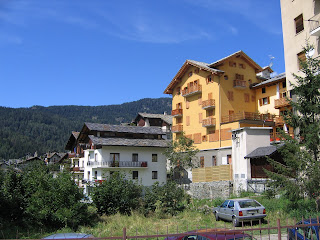
Brusson

Mountain Scene from Brusson
Leaving Brusson we then drove to the summit of the Col de Joue, where we stopped at a restaurant ‘Stella Alpina’ and had gnocci Piedmontese style that were excellent. We dined on the terrace looking down towards the City of Aosta. Needless to say, the hills were dotted with picturesque Swiss-like chalets. It all looked very rich and comfy indeed. We concluded lunch and took the hairpin turns to St. Vincent, and then it was back on the autostrada to meet Ornella at the appointed time of 3 PM at the Hotel.

Looking towards France - The View from the 'Stella D'Alpina' at the Summit of the Col de Joue.
When we arrived Ornella told us that the plans had firmed up for the evening. We would visit Renza and then go up to Ornella’s house and pick up Giacomo and then we were all going out to dinner at a restaurant just outside of Ivrea on the road to Aosta.
We once again drove back up the twists, turns and blind corners to the village of Brosso. Our first stop was at the Church, to take the obligatory view of the cemetery, the last resting place of so many of our family.

The Cemetery at the Brosso Churchyard
We drank in the wonderful vista of the Dora river and Ivrea below from the lofty churchyard. That done, we went over to Renza’s large home on the edge of town. At one time she and her now deceased husband ran an albergho there called the ‘Belavista.’ Renza is a robust and healthy woman in her late sixties who raised two fine daughters, both married with children, one of which was on vacation in Tunisia. I brought her up to date on the Canadian cousins and she did the same for the Italian side. She has some tenants in her big house. She worked at the post office for a number of years, as did her mother, but she was now in comfortable and no doubt, happy retirement.

Renza, Derek, Ornella
I should mention that most everyone in town looks well dressed and well nourished. The women – including women in their middle years - are really quite chic looking and ‘with it,’ well dressed and very well groomed.
From Renza’s we went to Ornella’s to pick up Giacomo for dinner and thence departed for the restaurant.
We arrived at the restaurant – just up the valley not far from Ivrea. It was near here that Renza’s daughter Mariangela’s husband had his contracting business. Betty arrived from Ivrea to join us, as well as Mariangela and her busband Andrea, Ornella and Giacomo and Derek and I.
Both Mariangela and Andrea looked great. They were the only ones of all of our Italian relatives who ever visited Canada. They came to Calgary in 1979 while on their honeymoon. Andrea had a successful business in the area, building and restoring buildings. He was able to retire at a relatively young age. Mariangela continues her job with the post office at the Town of Verres.
I was able to rap easily with them en francaise. Also there were in attendance Andrea’s brother Georgio and his wife, a lovely woman who had penetrating and compassionate eyes. Georgio complemented me in that he understood everything I said, and he didn’t think he was proficient in French. So we sat down to an excellent meal of salad, ravioli and very good enormous steaks. Conversations of relatives, previous visits, politics, Berlusconi (most of them thought he was a clown and perhaps a crook), life in Italy and Canada, dominated the evening.

L to R - Derek, Betty, Darryl, Mariangela, Giacomo and Ornella
At one point I proposed a toast to all of our friends and relatives in Italy and made the comment, that both my cousin and I were closer to the Italian relatives of ours in Brosso than we were to the Italian relatives of ours in Canada and the US. I reminded them that this was my sixth visit to Brosso, and that Gary had made even more visits than I and had spent more time there than I, and that we both cherished the place and our many friends and cousins there. I confess that I became quite emotional with my rather maudlin, wine-soaked orations. According to Derek, this impressed them mightily. Giacomo followed my toast with a equally teary, and heart tugging story about a young American soldier who had come to Inverso after serving in Viet Nam, to leave the bullets that were taken from his wounded body, with relatives in Inverso, there to be kept forever.

L to R - Derek, Betty Darryl, Mariangela, Giacomo, Ornella and Giorgio
They gave me a wooden sugar dish and spoon as a souvenir. The dinner ended with some excellent grappa and dolce and vows that we would meet again soon. We took a few photographs of the occasion, then kissed everybody on both cheeks with heartfelt goodbyes.

L to R - Derek, Mariangela and Andrea's son, Andrea, Darryl and Mariangela
Betty drove us back to the hotel.
The next day at about 10:30, Betty called. We both spoke to Betty and Fiora. They wished us God-speed, and we thanked them profusely.
Thus ended the adventure. It was a wonderful visit. The country as we all know is magnificent in many ways – whether it be art, its dramatic countryside, wonderfully preserved history, outstanding cuisine and wonderful vintages, generosity and the plain joy of living. Yes, Italy, most certainly Piedmont and the wonderful village of Brosso, has it all.
It makes one wonder why my forbearers ever left. But things were very much different there in those days than they are today.
Derek and I went on to Verona and Venice – 2 days each. He then returned, and I had two excellent days in Milan and then in London.
It was a great trip!


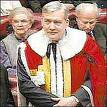


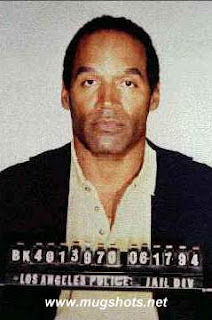
























 The other Piazza with City Hall on the left
The other Piazza with City Hall on the left 












